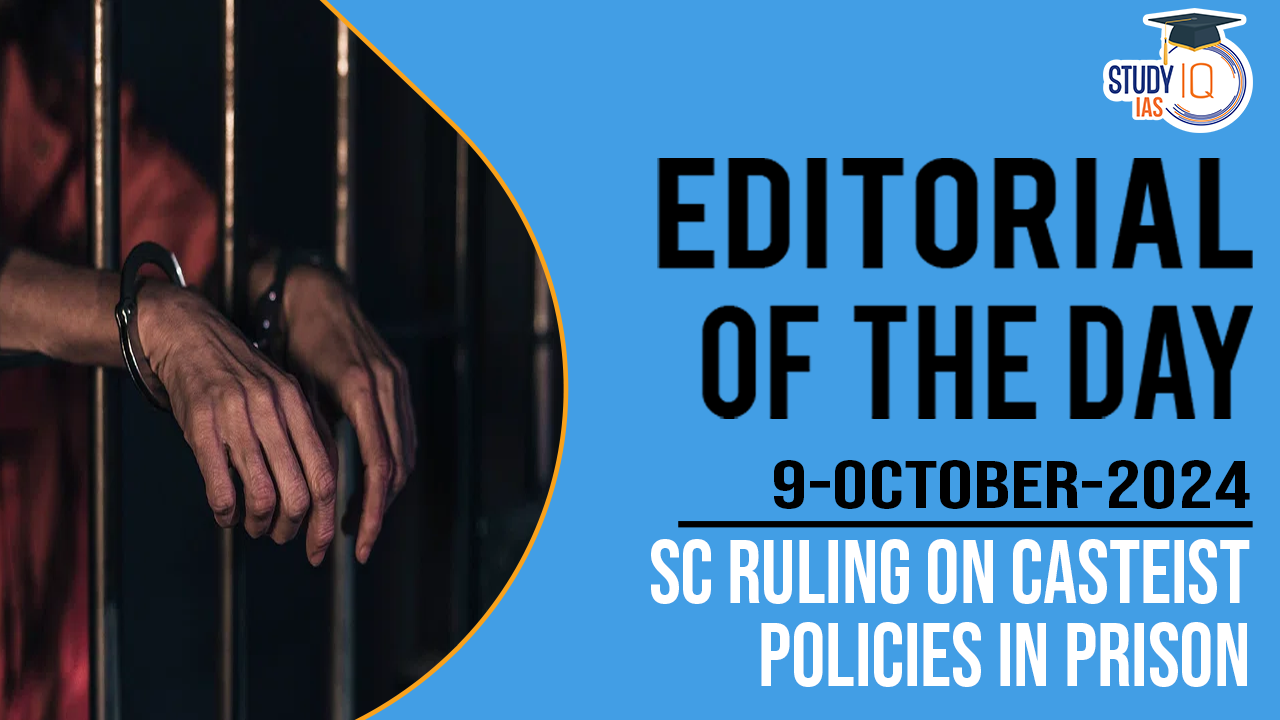Table of Contents
Context: Recently, the Supreme Court of India struck down a series of rules in various state prison manuals that were deemed to reinforce caste differences and violate the fundamental rights of prisoners, particularly targeting marginalised communities historically labelled as “criminal tribes.”
Why Did the Supreme Court Strike Down These Rules?
- The Supreme Court’s decision on October 3 came in response to a plea filed by journalist Sukanya Shantha.
- The plea challenged provisions in state prison manuals from Uttar Pradesh, West Bengal, Andhra Pradesh, Madhya Pradesh, Odisha, Kerala, Tamil Nadu, Maharashtra, Karnataka, Rajasthan, and Himachal Pradesh.
- These rules reinforced caste-based labour divisions in prisons, violating the fundamental rights of prisoners.
- The court found that the manuals perpetuated social hierarchies and were unconstitutional.
Caste-Based Labour Divisions in Prison Manuals
- Madhya Pradesh Jail Manual (1987): Prisoners from the ‘Mehtar’ caste, a Scheduled Caste community, were specifically assigned to latrine cleaning work. These prisoners had to empty and clean latrines during ‘latrine parades’.
- West Bengal Jail Code Rules (1967): Prison work was explicitly divided based on caste. Rule 741 required food to be cooked and delivered by prisoners of a “suitable caste,” reinforcing caste segregation.
Supreme Court’s Orders
- The court declared all the caste-based provisions and rules in question unconstitutional.
- Directive to States and Union Territories: They must revise their prison manuals within 3 months.
- Directive to the Centre: Necessary changes must be made to the Model Prison Manual (2016) and the draft Model Prisons and Correctional Services Act (2023) within the same period to eliminate caste discrimination.
Historical Context: Reinforcing Colonial Stereotypes
- The Criminal Tribes Act of 1871 allowed the British to label certain communities as “criminal tribes,” subjecting them to restrictions and stereotypes of being born criminals.
- Though the Act was repealed in 1952, former “criminal tribes” became denotified tribes, but the caste-based rules in prison manuals continued to stereotype and classify prisoners based on caste and occupation.
- Madhya Pradesh Rule 411: Allowed the state to treat any member of a denotified tribe as a habitual criminal, even without a previous conviction.
- Similar rules existed in Andhra Pradesh, Tamil Nadu, and Kerala.
Fundamental Rights Violated
- Right to Equality (Article 14): The court stated that caste can only be used as a classification if it benefits victims of discrimination.
- Segregating prisoners based on caste reinforces caste differences and deprives prisoners of equal opportunities for reform.
- Right Against Discrimination (Article 15): The manuals directly discriminated by assigning menial tasks like cleaning to marginalised castes, while higher castes were assigned tasks like cooking.
- This perpetuates the stereotype that marginalised communities are unfit for skilled, dignified
- Abolition of Untouchability (Article 17): Several rules, such as those in Uttar Pradesh, required prisoners from specific castes to perform degrading tasks. This was a continuation of the untouchability
- Right to Life with Dignity (Article 21): The right to life includes the growth of individual personality and the ability to overcome caste barriers.
- These prison rules limited the reformation of prisoners from marginalised communities, violating their dignity and right to equal treatment.
- Prohibition of Forced Labour (Article 23): Imposing degrading tasks on marginalised castes while allowing other castes to perform more desirable work was considered forced labour under Article 23.


 Navigating Uncharted Waters: What Next f...
Navigating Uncharted Waters: What Next f...
 Astronaut Reentry Explained: How Spacecr...
Astronaut Reentry Explained: How Spacecr...
 Missile Interceptors Explained: Role in ...
Missile Interceptors Explained: Role in ...




















